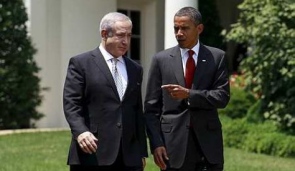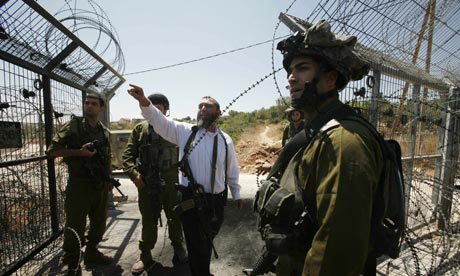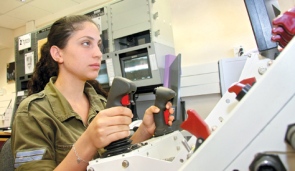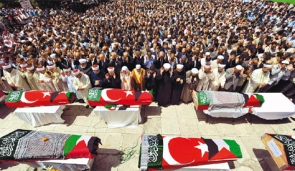EDITOR: Name change required in order to bring peace to the Middle East!
Obama has at last worked out what is wrong with Israelis. No, it is not the fact that they feel the need to kill Palestinians and other Arabs, neither their brutal occupation. It is their deep suspicion of his middle name! So as his first name is already a Hebrew one, why not change his middle name to a Hebrew one also? Maybe Benjamin? Shimon? Avigdor? Just think how esteemed a US president will be with a name like Barack Avigdor Obama… on second thoughts, it will not work; he needs also to change Obama, it seems, in order to really increase the appeal. Go for it – Barack Avigdor Peres sounds so much better! Even the pictures look better!
Obama: Israelis suspicious of me because my middle name is Hussein: Haaretz
U.S. president tells Channel 2 Israel is unlikely to attack Iran without coordinating with the U.S.
U.S. President Barack Obama told Channel 2 News on Wednesday that he believed Israel would not try to surprise the U.S. with a unilateral attack on Iran.

In an interview aired Thursday evening, Obama was asked whether he was concerned Prime Minister Benjamin Netanyahu would try to attack Iran without clearing the move with the U.S., to which the president replied “I think the relationship between Israel and the U.S. is sufficiently strong that neither of us try to surprise each other, but we try to coordinate on issues of mutual concern.”
Obama spoke to Channel 2’s Yonit Levy one day after what he described as an “excellent” meeting with Netanyahu at the White House. The two leaders met alone for about 90 minutes Tuesday evening, during which time they discussed the peace process with the Palestinians, the contested Iranian nuclear program, and the strategic understandings between their two countries on Tehran’s efforts to achieve nuclear capabilities.
Netanyahu promised Obama during their meeting that Israel would undertake confidence-building measures toward the Palestinian Authority in the coming days and weeks. These steps are likely to include the transfer of responsibility over more parts of the West Bank over to PA security forces.
During the interview Wednesday, when confronted with the anxiety that some Israelis feel toward him, Obama said that “some of it may just be the fact that my middle name is Hussein, and that creates suspicion.”
“Ironically, I’ve got a Chief of Staff named Rahm Israel Emmanuel. My top political advisor is somebody who is a descendent of Holocaust survivors. My closeness to the Jewish American community was probably what propelled me to the U.S. Senate,” Obama said.
“I think that sometimes, particularly in the Middle East, there’s the feeling of the friend of my enemy must be my enemy, and the truth of the matter is that my outreach to the Muslim community is designed precisely to reduce the antagonism and the dangers posed by a hostile Muslim world to Israel and to the West,” Obama went on to say.
Obama added that he believed a peace agreement between Israel and the Palestinians could be achieved within his current term. “I think [Netanyahu] understands we’ve got a fairly narrow window of opportunity… We probably won’t have a better opportunity than we have right now. And that has to be seized. It’s going to be difficult.”
The American President entirely sidestepped the question of whether the U.S. would pressure Israel to extend a current 10-month moratorium on construction in West Bank settlements, failing to give a clear answer. The moratorium is set to expire in September, and Netanyahu has announced that he would not extend the timeframe. The U.S., however, views continued Israeli settlement construction as a serious obstacle to peace efforts.
When asked whether he thought Netanyahu was the right man to strike a peace deal with the Palestinians, the U.S. President said that “I think Prime Minister Netanyahu may be very well positioned to bring this about,” adding that Israel will have to overcome many hurdles in order to affect the change required to “secure Israel for another 60 years”
In a separate interview with another Israeli media outlet, Obama proclaimed that he was not “blindly optimistic” regarding the chances of a Middle East peace agreement.
Israel is right to be skeptical about the peace process, he said in another yet-to-be-aired interview that was taped on Wednesday. He noted during the interview that many people thought the founding of Israel was impossible, so its very existence should be “a great source of hope.”
Meanwhile on Wednesday, Netanyahu told U.S. Jewish leaders that direct Palestinian-Israeli talks would begin “very soon”, but warned that they would be “very, very tough.”
Netanyahu told his cabinet earlier this week before flying to Washington that the time had come for Palestinian President Mahmoud Abbas to prepare to meet directly with the Israelis, as it was the only way to advance peace.
Israelis and Palestinians have been holding indirect talks mediated by Obama’s special envoy to the Middle East, George Mitchell. Aides to Obama sounded a hopeful tone regarding the negotiations last week, telling reporters that the shuttle diplomacy between the two sides had paid off and the gaps have narrowed.
At a meeting with representatives of Jewish organizations at the Plaza Hotel late Wednesday, Netanyahu discussed the efforts to promote Middle East peace. “This is going to be a very, very tough negotiation,” he said, adding “the sooner the better.”
“Direct negotiations must begin right away, and we think that they will,” he said.
Israel threatens to expel Palestinian politicians from Jerusalem: The Guardian
Case of four men with affiliation to Hamas is first in which Israel has cited political grounds for expulsion from city
Mohammed Abu Tir, of the Palestinian Legislative Council, is in police custody for failing to leave the city by the end of June. Photograph: Stoyan Nenov/Reuters
Israeli authorities have threatened four Palestinian politicians with expulsion from Jerusalem because of their affiliation to Hamas in a case which could have wide ramifications for others deemed undesirable by the Jewish state.
Mohammed Abu Tir, 59, a member of the Palestinian Legislative Council (PLC), is in police custody for failing to leave the city by the end of last month. Instantly recognisable for his dyed orange beard, Abu Tir was released from an Israeli prison in May after almost four years, and was immediately told he must abandon political activity or leave Jerusalem.
Two other members of the PLC and a former Palestinian minister have moved into the grounds of the International Red Cross and Red Crescent in East Jerusalem in protest at the deportation orders.
The men’s cases are to be heard by the supreme court in September. However the court rejected a plea to prohibit deportation in the interim, so the men are at risk of being expelled from the city at any time.
The threatened deportations are part of a wider pattern of revoking the Jerusalem residency permits of Palestinians from the city. In most cases, Israel claims that the people it strips of the right to live in Jerusalem have voluntarily relocated to the West Bank or abroad. This is often contested by the individuals concerned and human rights groups representing them.
In 2008, more than 4,500 Palestinians were excluded from Jerusalem.
However the case of the four Hamas politicians is the first time Israel has cited political grounds for expelling people from the city.
“For the first time Israel is using a claim of disloyalty to revoke residency,” said Hasan Jabarin, director of the Israeli human rights group Adalah. “The consequences for Palestinians in East Jerusalem are dangerous. This case could open a new window to revoking residency on purely political grounds.”
Abu Tir was imprisoned with dozens of Hamas politicians and activists after the Palestinian election in January 2006, which was won by the Islamic militant party.
“The election was legal and transparent. They found themselves in jail simply because they were elected,” said Jabarin.
The men’s case has been raised in the past week in both the House of Commons and the House of Lords. Labour MP Andrew Slaughter asked whether the British government had raised the issue with the Israeli government.
Mahmoud Abbas, the Palestinian president, urged Israel to “stop these sort of actions”. Ahmad Bahar, the deputy speaker of the Palestinian parliament, described the revocation of residency permits as a “massive ethnic cleansing campaign”.
More than 270,000 Palestinians live in East Jerusalem, which Israel occupied and annexed in 1967.
In a separate development, Israel’s supreme court has rejected a petition on behalf of Gazan lawyer Fatima Sharif to be allowed to travel to the West Bank to begin a masters degree in human rights, citing the “current political-security situation”.
The Israel Defence Forces made it clear in the court hearing yesterday that there would be no relaxation of the policy restricting the movement of Palestinians in and out of Gaza except in the most extreme circumstances, despite Israel’s decision to ease its blockade of the territory.
EDITOR: Good news! Fewer war criminal to travel in Europe this year!
Counter Terrorism Bureau warns all Israelis traveling abroad: Haaretz
Bureau issues travel advisory warning of likely revenge attacks against Israelis by Iran or Hezbollah.
Israel’s Counter Terrorism Bureau on Thursday issued a travel advisory calling for Israelis to keep their wits about them in all parts of the world, suspicious of revenge attacks by Iran and Hezbollah.
According to the warning, Hezbollah continues to blame Israel for the assassination of Imad Mughniyeh, the Lebanese militia’s former operations officer, and Iran blames Israel for the death of a nuclear scientist in Tehran.
The bureau statement reads “according to our intelligence, there continue to be threats of revenge killings or kidnappings of Israelis traveling outside the country, especially businesspeople and high-ranking ex-government officials.”
The bureau advised Israelis traveling abroad to take precautions, completely avoid visiting countries mentioned in travel advisories and refuse all unexpected or tempting business or social offers and refuse all unexpected invitations to meetings, especially in remote areas and after dark.
The bureau further advised Israelis to refrain from entering a hotel room or place of residence and from receiving suspicious or unexpected visitors.
On extended stays abroad, the bureau advised altering one’s personal habits by varying traffic routes, restaurants, entertainment venues and hotels frequented.
An excellent meeting: Haaretz
Two statesmen met in Washington on Tuesday who are looking smaller and smaller, who are taking smaller and smaller steps.
By Gideon Levy
It really was an excellent meeting: The chance that a binational state will be established has improved as a result; relations between Israel and the United States are indeed “marvelous.” Israel can continue with the whims of its occupation. The president of the United States proved Tuesday that perhaps there has been change, but not as far as we are concerned.
If there remained any vestiges of hope in the Middle East from Barack Obama, they have dissipated; if some people still expected Prime Minister Benjamin Netanyahu to lead a courageous move, they now know they made a mistake (and misled others ).
The masked ball is at its peak: Preening each other, Obama and Netanyahu have proved that even their heavy layer of makeup can no longer hide the wrinkles. The worn-out, wizened old face of the longest “peace process” in history has been awarded another surprising and incomprehensible extention. It’s on its way nowhere.
The “warm” and “sympathetic” reception, albeit a little forced, including the presidential dog, Bo, the meeting of the wives, with the U.S. president accompanying the Israeli prime minister to the car in an “unprecedented” way, as the press enthused, cannot obscure reality. The reality is that Israel has again managed to fool not only America, but even its most promising president in years.
It was enough to listen to the joint press conference to understand, or better yet, not understand, where we are headed. Will the freeze continue? Obama and Netanyahu squirmed, formulated and obfuscated, and no clear answer was forthcoming. If there was a time when people marveled at Henry Kissinger’s “constructive ambiguity,” now we have destructive ambiguity. Even when it came to the minimum move of a construction freeze, without which there is no proof of serious intent on Israel’s part, the two leaders threw up a smoke screen. A cowardly yes-and-no by both.
More than anything, the meeting proved that the criminal waste of time will go on. A year and a half has passed since the two took office, and almost nothing has changed except lip service to the freeze. A few lifted roadblocks here, a little less blockade of Gaza there – all relatively marginal matters, a bogus substitute for a bold jump over the abyss, without which nothing will move.
When direct talks become a goal, without anyone having a clue what Israel’s position is – a strange negotiation in which everyone knows what the Palestinians want and no one knows for sure what Israel wants – the wheel not only does not go forward, it goes backward. There are plenty of excuses and explanations: Obama has the congressional elections ahead of him, so he mustn’t make Netanyahu angry.
After that, the footfalls of the presidential elections can be heard, and then he certainly must not anger the Jews. Foreign Minister Avigdor Lieberman is pressuring Netanyahu now; tomorrow it might be Likud MK Danny Danon, and after all, you can’t expect Netanyahu to commit political suicide. And there you have it, his term in office is over, with no achievements. Good for you, Obama; bravo Netanyahu. You managed to make a mockery of each other, and together, of us all.
Netanyahu will be coming back to Israel over the weekend, adorned with false accomplishments. The settlers will mark a major achievement. Even if they don’t not admit it – they are never satisfied, after all – they can rejoice secretly. Their project will continue to prosper. If they have doubled their numbers since the Oslo Accords, now they can triple them.
And then what? Here then is a question for Obama and Netanyahu: Where to? No playing for time can blur the question. Where are they headed? What will improve in another year? What will be more promising in another two years? The Syrian president is knocking at the door begging for peace with Israel, and the two leaders are ignoring him. Will he still be knocking in two years? The Arab League’s initiative is still valid; terror has almost ceased. What will the situation be after they have finished compromising over the freeze in construction of balconies and ritual baths?
Two statesmen met in Washington on Tuesday who are looking smaller and smaller, who are taking smaller and smaller steps. They have decided not to decide, which in itself is a decision. When the chance of a two-state solution has long since entered injury time, they have decided on more extra time. Get ready for the binational state, or the next round of bloodletting.





